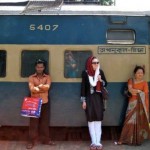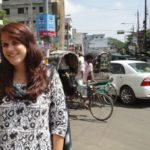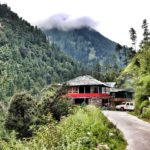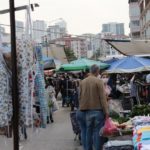Accepting Restrictions and Gaining Community in Chittagong
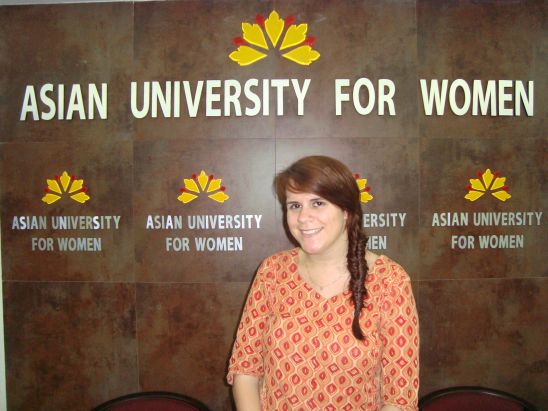
People stare at me when I leave my apartment. I know they can’t help themselves-white tourists are rare in Chittagong. Visitors to Bangladesh travel to the capital, Dhaka, or to a beach town on the coast. But I’m here to volunteer. I work at the Asian University for Women-which means that I’m not just a traveler but a temporary city dweller.
It frustrates me that I can’t experience privacy in the city where I will be living for the next year, but I realize Bangladeshis may simply view me as a foreigner, an alien occupier in Bangladesh-no matter how much I wish to integrate into the culture.
Though Bangladesh is a “developing country,” it has not felt like one to me. Only when I walk around outside do I recognize its immense poverty. My apartment, fully furnished and tiled with marble, has every convenience I had at home including air conditioning. At the markets and malls, I can find anything I might need, from shampoo and soap to DVDs and digital cameras.
Accepting Restrictions and Gaining Community in Chittagong
I eat tastier and fresher food than I ever have, I wear comfier clothes than I did in the States, and I work in a nicer office than I probably would in a city in the U.S. Even with the stares I get on the streets, Chittagong feels more like home-more like a “developed” country-than I expected.
While my comfortable living situation makes day-to-day life easier, it does alienate me from many of the people of Chittagong. Luckily, I do get a sense of belonging from my job at the newly established Asian University for Women.
The university, only in its third year, is an international community comprised of students from 12 countries and professors and teachers from several more. Its temporary campus is situated in downtown Chittagong, with plans to start construction on a much larger campus just outside of the city in order to accommodate many more students.
My role in the community is as a teacher in the Access Academy, a one-year university preparatory school for young women who need a year of English language instruction before they move on to the four-year university. I am also a teaching assistant in the undergraduate university as well.
Having come from impoverished villages, conflict zones, and refugee camps, their constant smiles, hard work, and involvement in campus activities are especially inspiring.
Many of the students, recruited from their high schools and often offered full scholarships, had the opportunity to attend a university closer to home but found AUW a better choice. Having come from impoverished villages, conflict zones, and refugee camps, their constant smiles, hard work, and involvement in campus activities are especially inspiring.
AUW, which has many global leaders on its board, was founded on the belief that everyone should have access to education and that young women from every background have the capacity to become leaders in their countries and chosen fields of study.
In my 3+ months at the university, I have witnessed my students seize the opportunities AUW has given them. Many of the women, who were previously taught to be quiet students who simply recite information, are now pushing themselves to think critically in their own way.
One of my students, though not the strongest, decided to schedule meetings with me to develop a strong analytical presentation, rather than struggle on her own. After several lackluster presentations, she amazed the class with a compelling and engaging presentation. She received an A+ and could not stop smiling for the rest of the day.
The most obvious change I have made is how I dress. I now wear the salwar kameez, which includes a long tunic-like shirt, pants, and an orna, or scarf. I do not dislike the salwar kameez. On the contrary, I enjoy wearing light clothing and the fact that it covers just about my whole body helps ward of unwanted stares from men.
By working at the university, I have become a default member of a community of strong and intelligent women, and with a 75% population of foreign students, I feel a sense of fellowship among the student body. I too am learning how to navigate my new home in Chittagong. In this relatively conservative Muslim city, women are viewed in a particular way (a way I’m discovering more fully each day) and are expected to exhibit certain behaviors.
The most obvious change I have made is how I dress. I now wear the salwar kameez, which includes a long tunic-like shirt, pants, and an orna, or scarf. I do not dislike the salwar kameez. On the contrary, I enjoy wearing light clothing and the fact that it covers just about my whole body helps ward of unwanted stares from men.
While this mode of dress allows my students and me to move freely throughout the city, we realize that people will make assumptions about women-white or otherwise-traveling alone in the country. Unlike in my own university life, my students must accept an early curfew, as well as other restrictions-least of all a lack of nightlife. Even some of my fellow teachers and I try to be in our apartment for the night by 10 PM or so.
Still, the experience of becoming part of the AUW community has been, at least for me, worth the sacrifices I’ve made.
Photo credit for Accepting Restrictions and Gaining Community in Chittagong by Kelsey B.

